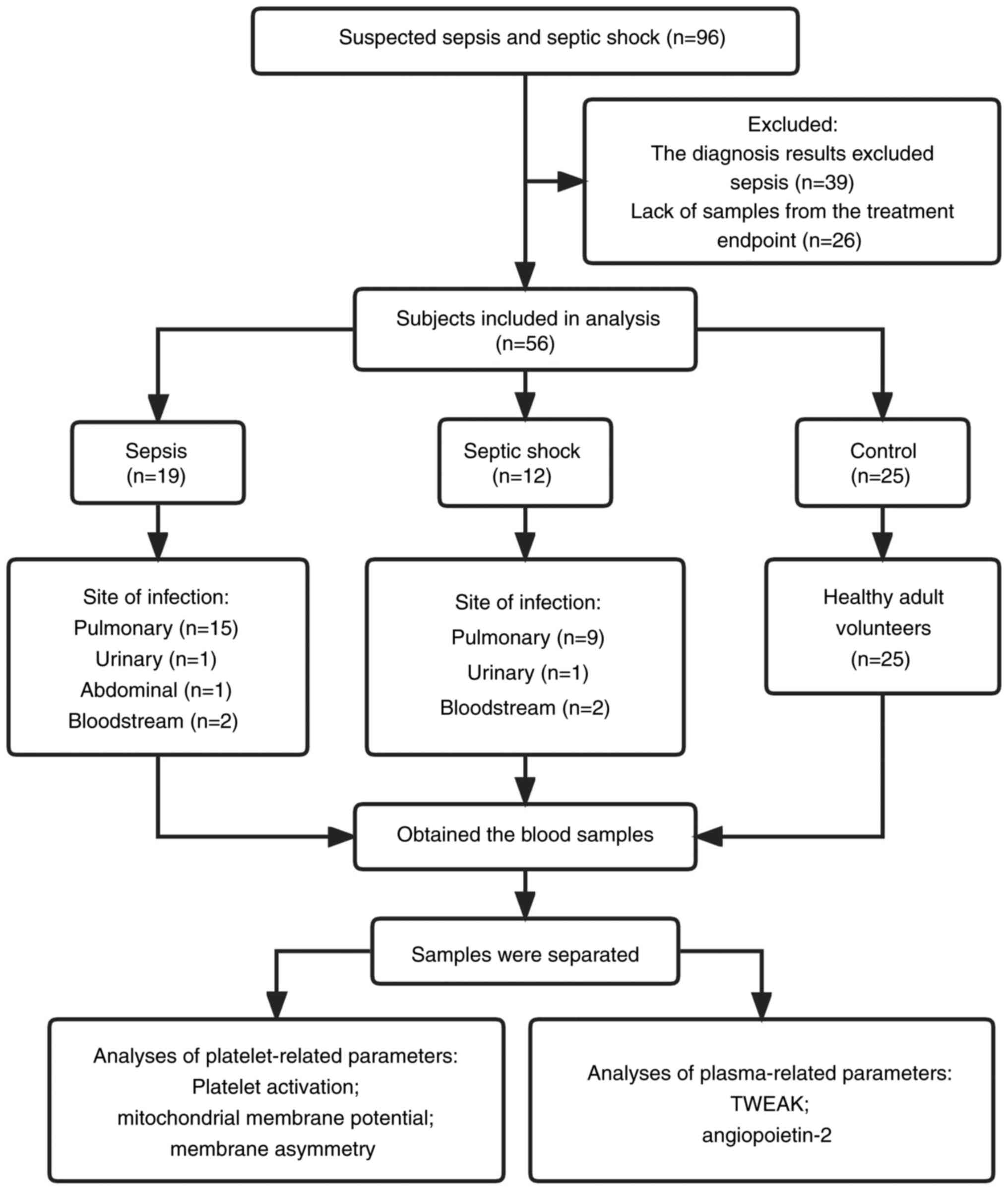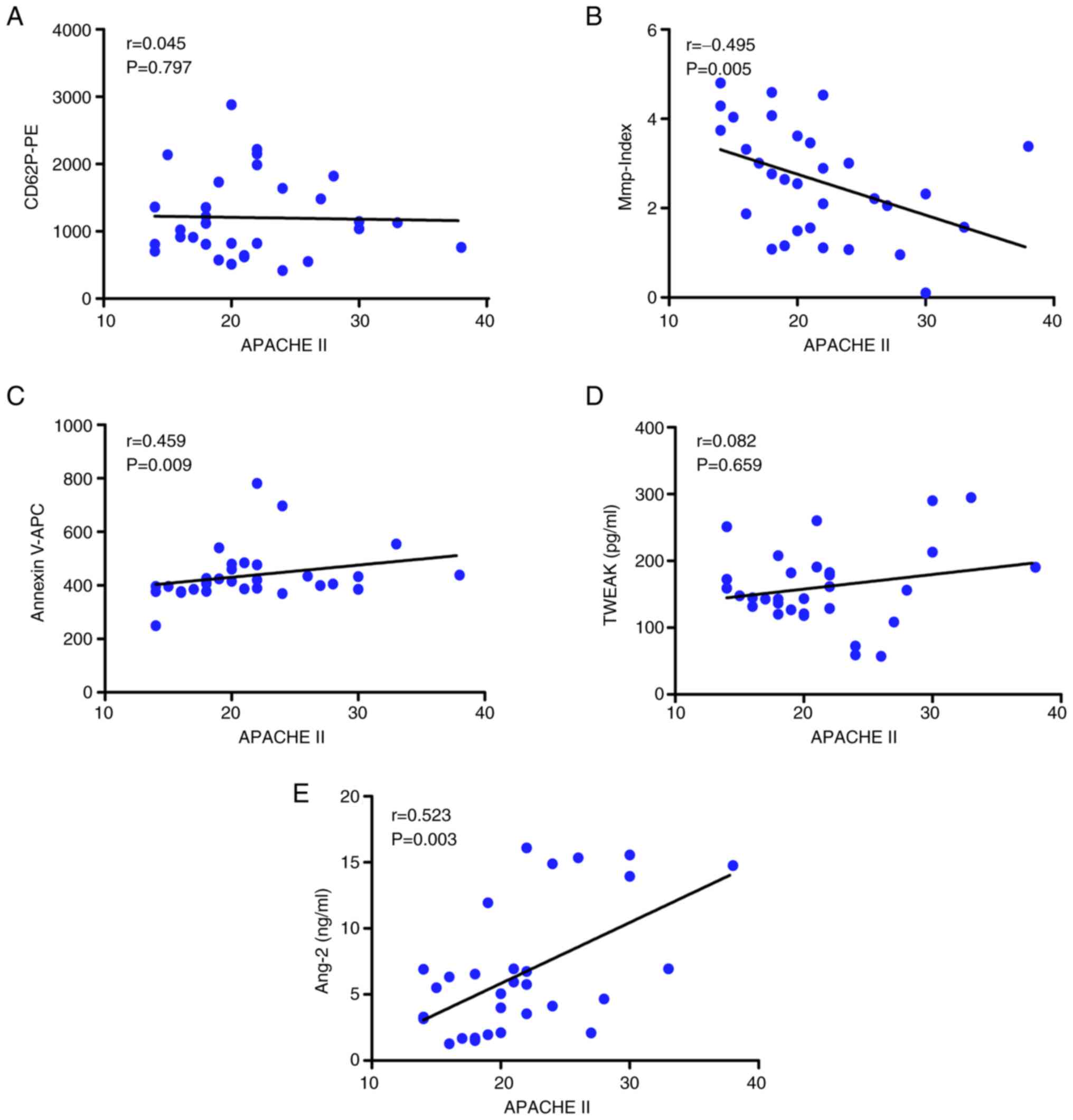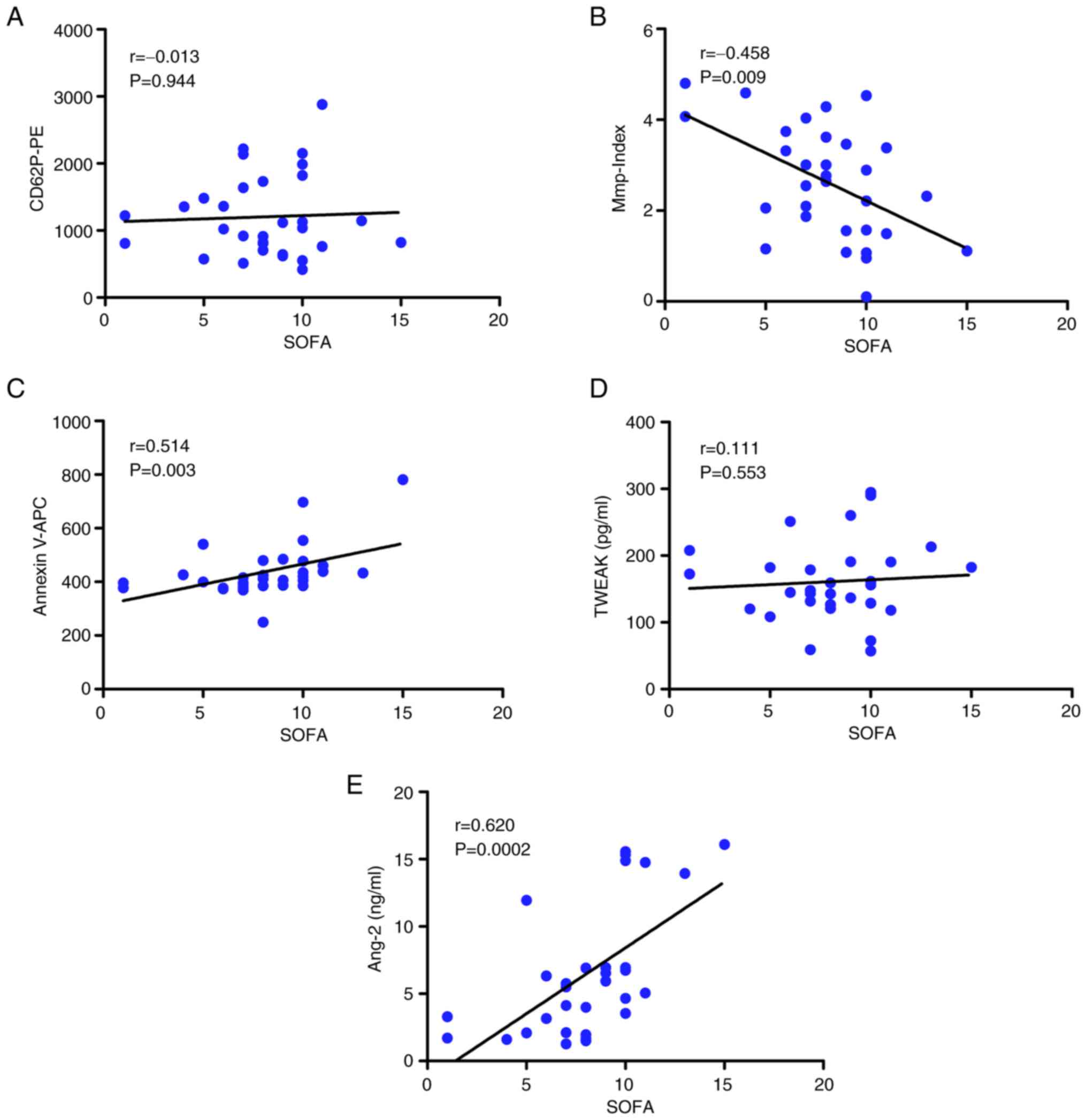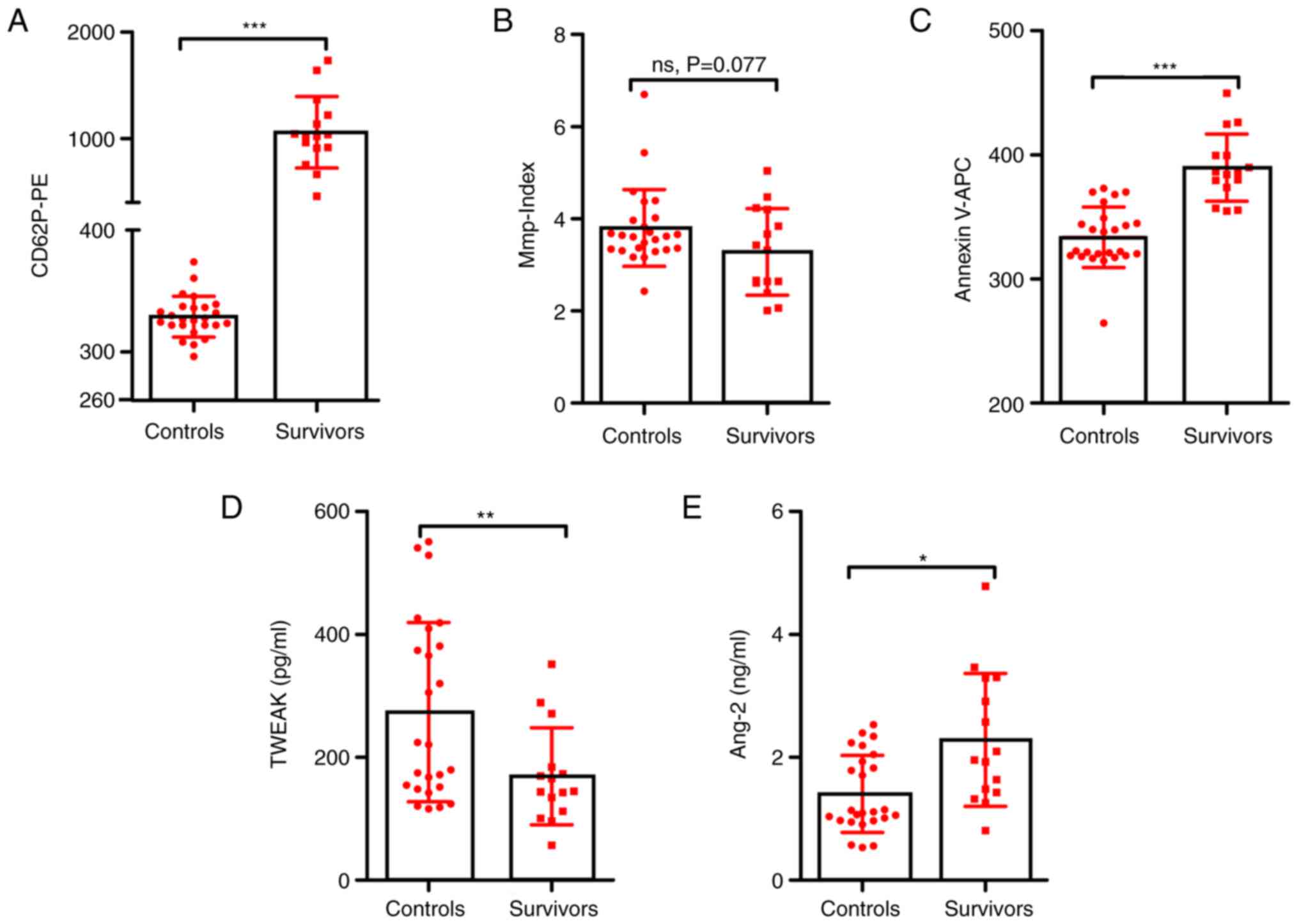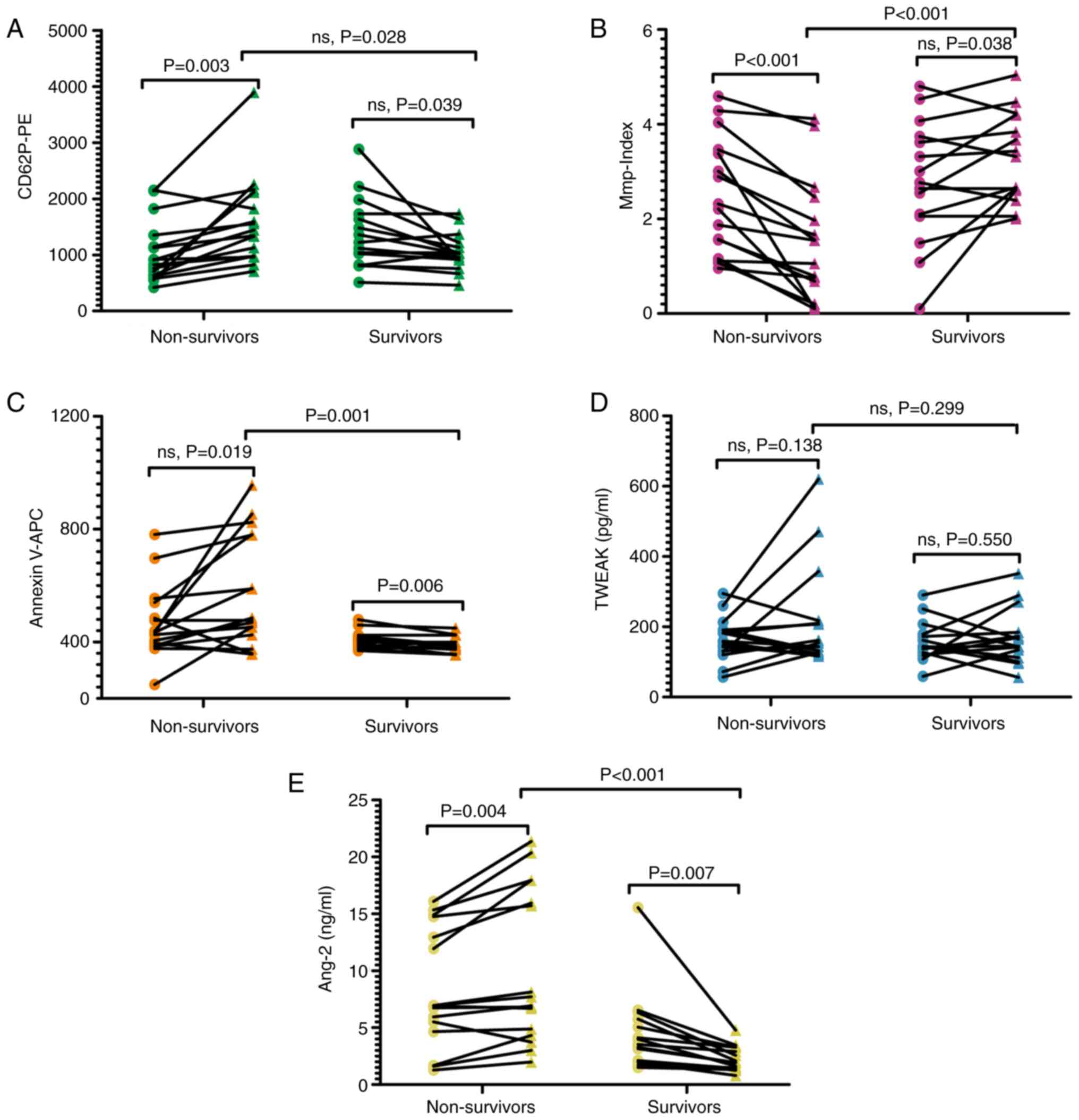|
1
|
Rudd KE, Johnson SC, Agesa KM, Shackelford
KA, Tsoi D, Kievlan DR, Colombara DV, Ikuta KS, Kissoon N, Finfer
S, et al: Global, regional, and national sepsis incidence and
mortality, 1990-2017: Analysis for the Global Burden of Disease
Study. Lancet. 395:200–211. 2020.PubMed/NCBI View Article : Google Scholar
|
|
2
|
An G and Cockrell RC: Agent-based modeling
of systemic inflammation: A pathway toward controlling sepsis.
Methods Mol Biol. 2321:231–257. 2021.PubMed/NCBI View Article : Google Scholar
|
|
3
|
Kataria Y and Remick D: Sepsis Biomarkers.
Methods Mol Biol. 2321:177–189. 2021.PubMed/NCBI View Article : Google Scholar
|
|
4
|
Cantey JB and Lee JH: Biomarkers for the
diagnosis of neonatal sepsis. Clin Perinatol. 48:215–227.
2021.PubMed/NCBI View Article : Google Scholar
|
|
5
|
Odum JD, Wong HR and Stanski NL: A
Precision medicine approach to biomarker utilization in pediatric
sepsis-associated acute kidney injury. Front Pediatr.
9(632248)2021.PubMed/NCBI View Article : Google Scholar
|
|
6
|
Dewitte A, Lepreux S, Villeneuve J,
Rigothier C, Combe C, Ouattara A and Ripoche J: Blood platelets and
sepsis pathophysiology: A new therapeutic prospect in critically
[corrected] ill patients. Ann Intensive Care. 7(115)2017.PubMed/NCBI View Article : Google Scholar
|
|
7
|
Al Saleh K and Al Qahtani RM: Platelet
count patterns and patient outcomes in sepsis at a tertiary care
center: Beyond the APACHE score. Medicine (Baltimore).
100(e25013)2021.PubMed/NCBI View Article : Google Scholar
|
|
8
|
Bouglé A and Duranteau J: Pathophysiology
of sepsis-induced acute kidney injury: The role of global renal
blood flow and renal vascular resistance. Contrib Nephrol.
174:89–97. 2011.PubMed/NCBI View Article : Google Scholar
|
|
9
|
Ge S, Ma Y, Xie M, Qiao T and Zhou J: The
role of platelet to mean platelet volume ratio in the
identification of adult-onset still's disease from sepsis. Clinics
(Sao Paulo). 76(e2307)2021.PubMed/NCBI View Article : Google Scholar
|
|
10
|
You S, Sun X, Zhou Y, Zhong C, Chen J,
Zhai W and Cao Y: The prognostic significance of white blood cell
and platelet count for inhospital mortality and pneumonia in acute
ischemic stroke. Curr Neurovasc Res. 18:427–434. 2021.PubMed/NCBI View Article : Google Scholar
|
|
11
|
Beyan C and Beyan E: Is mean platelet
volume and inflammatory activity really correlated in patients with
ankylosing spondylitis. Mod Rheumatol. 30(410)2020.PubMed/NCBI View Article : Google Scholar
|
|
12
|
Demir AD: Relationship of the platelet
distribution width/platelet count ratio with thyroid antibody
levels in patients with Hashimoto's thyroiditis. J Int Med Res.
49(3000605211043241)2021.PubMed/NCBI View Article : Google Scholar
|
|
13
|
Shen G, Li S, Shao Z, Liu L, Liu Q, Yu H,
Wang H and Mei Z: Platelet indices in patients with acute
appendicitis: A systematic review with meta-analysis. Updates Surg.
73:1327–1341. 2021.PubMed/NCBI View Article : Google Scholar
|
|
14
|
Zhou Y, Wei F and Liu C: Mean platelet
volume/platelet count ratio predicts long-term mortality in
patients with infective endocarditis. Biomark Med. 14:823–827.
2020.PubMed/NCBI View Article : Google Scholar
|
|
15
|
Li L, Yu J and Zhou Z: Platelet-associated
parameters in patients with psoriasis: A PRISMA-compliant
systematic review and meta-analysis. Medicine (Baltimore).
100(e28234)2021.PubMed/NCBI View Article : Google Scholar
|
|
16
|
Jiang SQ, Huang QF, Xie WM, Lv C and Quan
XQ: . The association between severe COVID-19 and low platelet
count: Evidence from 31 observational studies involving 7613
participants. Br J Haematol. 190:e29–e33. 2020.PubMed/NCBI View Article : Google Scholar
|
|
17
|
Chen Y, Yang Y, Cheng J, Lu J and Hu W:
Platelet count and mortality of H7N9 infected patients in
Guangdong, China. Platelets. 31:268–271. 2020.PubMed/NCBI View Article : Google Scholar
|
|
18
|
Leli C, Di Matteo L, Gotta F, Vay D,
Cavallo V, Mazzeo R, Busso S, Carrabba L and Rocchetti A: Clinical
utility of platelet count for screening of malaria. New Microbiol.
43:89–92. 2020.PubMed/NCBI
|
|
19
|
Kirby P, Smith S, Ward L, Hanson J and
Currie BJ: Clinical Utility of Platelet Count as a Prognostic
Marker for Melioidosis. Am J Trop Med Hyg. 100:1085–1087.
2019.PubMed/NCBI View Article : Google Scholar
|
|
20
|
Shah D, Khataniar M, Sawhney A, Nautiyal
M, Desai R and Kakar A: An observational study to see the
correlation between trends of platelet counts and immature platelet
fraction in dengue infection. Trop Doct. 51:378–381.
2021.PubMed/NCBI View Article : Google Scholar
|
|
21
|
Zhang S, Zheng Y, Chen S, Huang S, Liu K,
Lv Q, Jiang Y and Yuan Y: Suilysin-induced platelet-neutrophil
complexes formation is triggered by pore formation-dependent
calcium Influx. Sci Rep. 6(36787)2016.PubMed/NCBI View Article : Google Scholar
|
|
22
|
Zhang S, Wang J, Chen S, Yin J, Pan Z, Liu
K, Li L, Zheng Y, Yuan Y and Jiang Y: Effects of suilysin on
streptococcus suis-induced platelet aggregation. Front Cell Infect
Microbiol. 6(128)2016.PubMed/NCBI View Article : Google Scholar
|
|
23
|
Singer M, Deutschman CS, Seymour CW,
Shankar-Hari M, Annane D, Bauer M, Bellomo R, Bernard GR, Chiche
JD, Coopersmith CM, et al: The third international consensus
definitions for sepsis and septic shock (Sepsis-3). JAMA.
315:801–810. 2016.PubMed/NCBI View Article : Google Scholar
|
|
24
|
Wang H, Kang X, Shi Y, Bai ZH, Lv JH, Sun
JL and Pei HH: SOFA score is superior to APACHE-II score in
predicting the prognosis of critically ill patients with acute
kidney injury undergoing continuous renal replacement therapy. Ren
Fail. 42:638–645. 2020.PubMed/NCBI View Article : Google Scholar
|
|
25
|
Nagai M, Hirayama K, Ebihara I, Higuchi T,
Imaizumi M, Maruyama H, Miyamoto Y, Kakita T, Ogawa Y, Fujita S, et
al: Serum TNF-related and weak inducer of apoptosis levels in
septic shock patients. Ther Apher Dial. 15:342–348. 2011.PubMed/NCBI View Article : Google Scholar
|
|
26
|
Michels M, van der Ven AJ, Djamiatun K,
Fijnheer R, de Groot PG, Griffioen AW, Sebastian S, Faradz SM and
de Mast Q: Imbalance of angiopoietin-1 and angiopoetin-2 in severe
dengue and relationship with thrombocytopenia, endothelial
activation, and vascular stability. Am J Trop Med Hyg. 87:943–946.
2012.PubMed/NCBI View Article : Google Scholar
|
|
27
|
Karabulut B and Alatas SO: Diagnostic
Value of neutrophil to lymphocyte ratio and mean platelet volume on
early onset neonatal sepsis on term neonate. J Pediatr Intensive
Care. 10:143–147. 2021.PubMed/NCBI View Article : Google Scholar
|
|
28
|
McDonald B and Dunbar M: Platelets and
Intravascular Immunity: Guardians of the vascular space during
bloodstream infections and sepsis. Front Immunol.
10(2400)2019.PubMed/NCBI View Article : Google Scholar
|
|
29
|
Mangalesh S, Dudani S and Malik A:
Platelet Indices and their kinetics predict mortality in patients
of sepsis. Indian J Hematol Blood Transfus. 24:1–9. 2021.PubMed/NCBI View Article : Google Scholar
|
|
30
|
Tunjungputri RN, van de Heijden W, Urbanus
RT, de Groot PG, van der Ven A and de Mast Q: Higher platelet
reactivity and platelet-monocyte complex formation in Gram-positive
sepsis compared to Gram-negative sepsis. Platelets. 28:595–601.
2017.PubMed/NCBI View Article : Google Scholar
|
|
31
|
Gründler K, Angstwurm M, Hilge R, Baumann
P, Annecke T, Crispin A, Sohn HY, Massberg S and Kraemer BF:
Platelet mitochondrial membrane depolarization reflects disease
severity in patients with sepsis and correlates with clinical
outcome. Crit Care. 18(R31)2014.PubMed/NCBI View Article : Google Scholar
|
|
32
|
Kümpers P, van Meurs M, David S, Molema G,
Bijzet J, Lukasz A, Biertz F, Haller H and Zijlstra JG: Time course
of angiopoietin-2 release during experimental human endotoxemia and
sepsis. Crit Care. 13(R64)2009.PubMed/NCBI View
Article : Google Scholar
|
|
33
|
Yamakawa K, Ogura H, Koh T, Ogawa Y,
Matsumoto N, Kuwagata Y and Shimazu T: Platelet mitochondrial
membrane potential correlates with severity in patients with
systemic inflammatory response syndrome. J Trauma Acute Care Surg.
74:411–417. 2013.PubMed/NCBI View Article : Google Scholar
|
|
34
|
Abós B, Pérez-Fernández E, Morel E,
Perdiguero P and Tafalla C: Pro-Inflammatory and B Cell Regulating
Capacities of TWEAK in Rainbow Trout (Oncorhynchus mykiss).
Front Immunol. 12(748836)2021.PubMed/NCBI View Article : Google Scholar
|
|
35
|
Manu V, Chakrabarty BK and Singh S:
Analysis of platelet-activating factors in severe sepsis by flow
cytometry and its correlation with clinical sepsis scoring system:
A pilot study. Med J Armed Forces India. 75:429–36. 2019.PubMed/NCBI View Article : Google Scholar
|
|
36
|
Lhermusier T, Chap H and Payrastre B:
Platelet membrane phospholipid asymmetry: From the characterization
of a scramblase activity to the identification of an essential
protein mutated in Scott syndrome. J Thromb Haemost. 9:1883–1891.
2011.PubMed/NCBI View Article : Google Scholar
|
|
37
|
Vinholt PJ: The role of platelets in
bleeding in patients with thrombocytopenia and hematological
disease. Clin Chem Lab Med. 57:1808–1817. 2019.PubMed/NCBI View Article : Google Scholar
|
|
38
|
Hanafi MMM, Afzan A, Yaakob H, Aziz R,
Sarmidi MR, Wolfender JL and Prieto JM: In Vitro Pro-apoptotic and
anti-migratory effects of Ficus deltoidea L. plant extracts
on the human prostate cancer cell lines PC3. Front Pharmacol.
8(895)2017.PubMed/NCBI View Article : Google Scholar
|
|
39
|
Cao Y, Ma W, Liu Z, Pei Y, Zhu Y, Chen F,
Zou L, Jiang Y, Liu X, Huang J, et al: Early predictive value of
platelet function for clinical outcome in sepsis. J Infect.
84:628–636. 2022.PubMed/NCBI View Article : Google Scholar
|
|
40
|
Roderburg C, Benz F, Schüller F, Pombeiro
I, Hippe HJ, Frey N, Trautwein C, Luedde T, Koch A, Tacke F and
Luedde M: Serum levels of TNF receptor ligands are dysregulated in
sepsis and predict mortality in Critically Ill patients. PLoS One.
11(e0153765)2016.PubMed/NCBI View Article : Google Scholar
|
|
41
|
Melendez E, Whitney JE, Norton JS,
Silverman M, Harju-Baker S, Mikacenic C, Wurfel MM and Liles WC:
Systemic Angiopoietin-1/2 dysregulation in pediatric sepsis and
septic shock. Int J Med Sci. 16:318–323. 2019.PubMed/NCBI View Article : Google Scholar
|
|
42
|
Hussain RM, Neiweem AE, Kansara V, Harris
A and Ciulla TA: Tie-2/Angiopoietin pathway modulation as a
therapeutic strategy for retinal disease. Expert Opin Investig
Drugs. 28:861–869. 2019.PubMed/NCBI View Article : Google Scholar
|
|
43
|
Khan M, Aziz AA, Shafi NA, Abbas T and
Khanani AM: Targeting Angiopoietin in Retinal Vascular Diseases: A
Literature review and summary of clinical trials involving
faricimab. Cells. 9(1869)2020.PubMed/NCBI View Article : Google Scholar
|
|
44
|
Wright JK, Hayford K, Tran V, Al Kibria
GM, Baqui A, Manajjir A, Mahmud A, Begum N, Siddiquee M, Kain KC
and Farzin A: Biomarkers of endothelial dysfunction predict sepsis
mortality in young infants: A matched case-control study. BMC
Pediatr. 18(118)2018.PubMed/NCBI View Article : Google Scholar
|
|
45
|
Fang Y, Li C, Shao R, Yu H, Zhang Q and
Zhao L: Prognostic significance of the
angiopoietin-2/angiopoietin-1 and angiopoietin-1/Tie-2 ratios for
early sepsis in an emergency department. Crit Care.
19(367)2015.PubMed/NCBI View Article : Google Scholar
|
|
46
|
Liu Y, Hou JH, Li Q, Chen KJ, Wang SN and
Wang JM: Biomarkers for diagnosis of sepsis in patients with
systemic inflammatory response syndrome: A systematic review and
meta-analysis. Springerplus. 5(2091)2016.PubMed/NCBI View Article : Google Scholar
|
|
47
|
Matowicka-Karna J: Markers of
inflammation, activation of blood platelets and coagulation
disorders in inflammatory bowel diseases. Postepy Hig Med Dosw.
70:305–312. 2016.PubMed/NCBI View Article : Google Scholar
|















